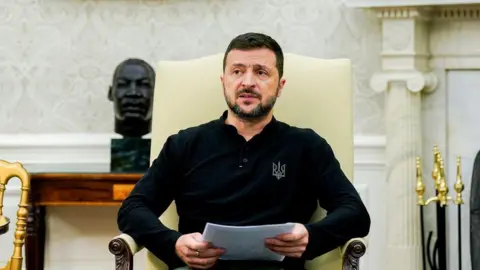Ukrainian President Volodymyr Zelensky has expressed hope that the United States will “stand strong” against Russian demands to lift sanctions as a condition for a ceasefire in the Black Sea. Moscow has insisted that Western sanctions on Russia’s food and fertilizer trade be lifted before the maritime truce, which was announced earlier this week, can take effect. The Russian government also requested the removal of financial restrictions and the restoration of Russia’s access to the Swift international payment system, a crucial financial network.
While the White House confirmed that Russian and Ukrainian delegations agreed to a ceasefire after talks with U.S. officials in Saudi Arabia, the Kremlin’s subsequent statement outlined its conditions. Zelensky, however, expressed concern that some in the U.S. might be influenced by Russian narratives, undermining the bipartisan support his country has received. He made it clear that Ukraine cannot accept these Russian-driven narratives.
The U.S. government, through former President Donald Trump, has acknowledged Moscow’s request and stated that they are “looking at” the possibility of easing sanctions. However, the European Union has firmly rejected lifting any sanctions unless Russia withdraws its troops from Ukraine’s internationally recognized territory unconditionally. Zelensky, in a panel interview in Paris, also voiced concerns about the role of U.S. figures like Trump envoy Steve Witkoff, who dismissed European efforts to create a “coalition of the willing” to support Ukraine. Zelensky questioned Witkoff’s experience and pointed out that his background in real estate was far removed from the complexities of international diplomacy.
During the interview, Zelensky was asked how history would remember him—whether as the man who saved Ukraine or as the one who let it fall. He responded by saying that it was not his concern how history would judge him; his focus remains on defending Ukraine and ensuring his children can walk freely in their streets. He reaffirmed his commitment to defending Ukraine for as long as he could.
On the issue of Ukraine’s potential NATO membership, Zelensky emphasized that Ukraine, now “battle-hardened” by the ongoing war, would strengthen the alliance, though he acknowledged that the Trump administration had ruled out membership for Kyiv in the past.
Zelensky’s return to Europe is part of his ongoing effort to rally support from European nations as the war in Ukraine continues. European leaders have been slow to commit substantial military support, traditionally relying on the U.S. for military capacity. However, the changing geopolitical dynamics, particularly after comments from Trump, have led European leaders to realize they may need to act more independently in the future.
In a sign of continued European support, French President Emmanuel Macron has announced a €2bn military aid package for Ukraine, and Macron has also made it clear that Moscow cannot “dictate the conditions” for peace. Ahead of a European leaders’ meeting in Paris, which will also include British Prime Minister Keir Starmer, Macron said it was too early to consider lifting sanctions on Russia. The gathering aims to discuss the next steps for supporting Ukraine and the potential for a ceasefire agreement.

